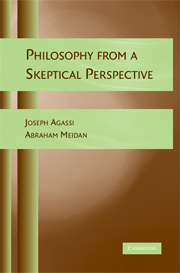2 - Skepticism
Published online by Cambridge University Press: 05 June 2012
Summary
The Strange Story of the Idea of Error Avoidance
Skeptics have claimed that there is no knowledge, that everything we say is doubtful; hence, error is unavoidable.
Socrates presented himself as a skeptic. By raising questions, he undermined assertions that his peers considered obvious truths. He concluded that one's wisdom rests on the awareness of one's ignorance. His most illustrious disciple was Plato, who founded the Academy and introduced an entrance requirement: one first had to know some mathematics. Plato took mathematics to be true knowledge and the foundation of all other true knowledge, including the political knowledge that is required for the best government. After his death, the Academy returned to the Socratic tradition and was renowned for its skepticism. The philosophers who taught there practiced the method of arguing for and against different answers to given questions and suspended all judgments about which answer is right.
The idea that the suspension of judgment is a virtue became the central teaching of Pyrrho and his followers, the Pyrrhonists. There is no written evidence attesting to Pyrrho's position, but the prevalent view regarding it follows Sextus Empiricus and presents Pyrrhonism as follows. Those who wish to dwell in a peaceful mood (ataraxia) should try to argue against every position that they tend to prefer: their view of any question should be as balanced as possible. As a result, they will refrain from assuming any position, and the outcome will be a permanent state of peace of mind.
- Type
- Chapter
- Information
- Philosophy from a Skeptical Perspective , pp. 24 - 59Publisher: Cambridge University PressPrint publication year: 2008
References
- 1
- Cited by



